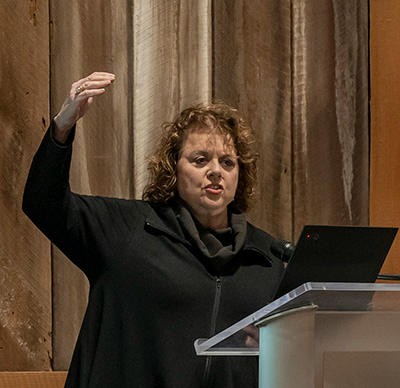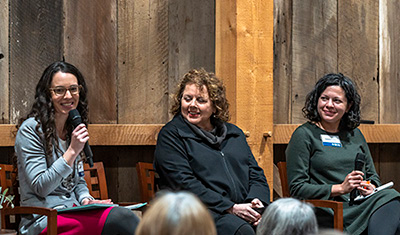Laurie Garrett Recounts Public Health Failures In Talk On COVID-19 And Pandemic Preparedness
Sponsored by UCSC’s Global and Community Health Program, Garrett’s talk highlighted the urgent need to strengthen public health infrastructure
 Alumna Laurie Garrett spoke about the need for stronger public health programs. (Photo by Daris Jasper)
Alumna Laurie Garrett spoke about the need for stronger public health programs. (Photo by Daris Jasper)
 Laurie Garrett (center) discussed public health issues with Assistant Professor of Sociology Alicia Riley (left) and Assistant Professor of Molecular, Cell and Developmental Biology Valerie Cortez (right). (Photo by Daris Jasper)
Laurie Garrett (center) discussed public health issues with Assistant Professor of Sociology Alicia Riley (left) and Assistant Professor of Molecular, Cell and Developmental Biology Valerie Cortez (right). (Photo by Daris Jasper)
UCSC alumna Laurie Garrett, an award-winning science writer and bestselling author, discussed the emergence of SARS-CoV-2, the national and global response to the pandemic, and the implications for future infectious disease outbreaks in a public talk at the Hay Barn on Thursday, November 10.
Known for her extensive knowledge of emerging diseases and public health, Garrett said she has become “deeply angry and disappointed with what has happened with COVID, not just in our nation but worldwide.” She went on to describe numerous missed opportunities to better control the pandemic and limit its impact, which, she said, “I fear will be missed again with the next microbe and the next—and believe me, there will be a next, and a next, and a next.”
Garrett’s books include The Coming Plague: Newly Emerging Diseases in a World out of Balance (1994), Betrayal of Trust: The Collapse of Global Public Health (2000), and I Heard the Sirens Scream: How Americans Responded to the 9/11 and Anthrax Attacks (2011). She has received the Pulitzer Prize, Peabody Award, and Polk Award (twice) for her work.
Chancellor Cynthia Larive introduced Garrett, noting that “her work reflects our deep campuswide commitment to social justice, to science, truth, and community engagement, and her association with UC Santa Cruz is a source of pride for me and for our campus.”
The event was sponsored by UCSC’s Global and Community Health Program. With the COVID-19 pandemic continuing to disrupt people’s lives and the global economy, the need for strong local, national, and global public health programs has never been more apparent.
In her remarks, Garrett emphasized the devastating economic toll of the pandemic.
“They’re now calling this the $16 trillion virus,” she said, referring to an estimate of the total cost of the pandemic by economists David Cutler and Lawrence Summers, published in the medical journal JAMA in 2020.
Could this have been avoided? Garrett described two possible scenarios for responding to COVID that she presented in April 2020 to the leaders of United Nations agencies. In the first scenario, she said, “the rich world takes care of itself,” and vaccines get rolled out first in the wealthy nations (which is essentially what happened). Uncontrolled circulation of the virus in unvaccinated populations would allow it to evolve, and newly emerging strains would cycle back and forth between the northern hemisphere and the southern hemisphere. The result, she told them, would be “a permanent burden on the U.N. system, just like with HIV.”
The alternative scenario, Garrett said, would require effective disease surveillance and vaccination on a global scale. She outlined the technologies and policies needed to achieve this, including point-of-care diagnostic tools; universal, transparent access to information and data on infections and vaccination rates; a vaccine that is effective at blocking transmission and affordably priced; funding to establish the infrastructure for vaccine distribution; identification of animal carriers of the virus and closing of live animal markets; environmental surveillance to detect the virus; and effective communications to combat misinformation.
This second scenario of a global response to control the virus would also require China and the United States to collaborate, and the U.N. leadership told her that was not likely to happen, Garrett said. The problem, she said, is that “we are lacking any global governance that can protect human health.”
Garrett ended her prepared remarks by repeating her call for a system of environmental surveillance to detect emerging diseases. “We need a permanent and long-term way of knowing what is going on in our environment,” she said.
Garrett was then joined onstage by two of the core faculty in global and community health, Assistant Professor of Sociology Alicia Riley and Assistant Professor of Molecular, Cell and Developmental Biology Valerie Cortez.
Riley, noting that Garrett has been “making these calls for an early warning system for detecting emerging infection threats since her first book,” asked how her views have evolved as she has lived through the emergence of new diseases. In her response, Garrett sounded discouraged.
“Where we are now, the CDC has lost its reputation, and our own credibility as a voice of how to fight disease has been undermined by the U.S. having the highest death burden in the world, and we seem incapable of acting in any kind of solidarity as a nation to combat COVID,” she said. “At this point, when I say we need to be out there funding surveillance, I feel like there’s less listening today than 20 years ago.”
Cortez asked Garrett to address “what we as educators can do” to prepare students to address these issues so that our public health systems can be better prepared to handle future emerging diseases. Garrett noted that “the financial incentives are all in the wrong place,” and funding for public health is woefully inadequate.
“The interest is there among the kids—they want to be out there doing something meaningful, and global health is attractive to them,” she said. “The problem is who’s going to finance them. Schools of public health have to teach kids politics 101—how to put a bill before your city council. They have to become skilled at making the argument for sustained funding that will make it possible for them to achieve their goals.”
Riley said that actually fits well with the goals of UCSC’s interdisciplinary Global and Community Health Program, which aims to give students a broad set of knowledge and skills by bringing together faculty in a range of disciplines, from the social sciences to biomedicine.
As Chancellor Larive said in her introductory remarks, “Our goal is to educate a new generation of health leaders and health workers with expertise drawn from a wide array of disciplines, and with the ability to communicate and learn from one another across a diversity of perspectives. Through this interdisciplinary education, we hope to contribute to the health of all communities, global and local, in which our students will work in the future.”
Publication: David M. Cutler, et al., The COVID-19 Pandemic and the $16 Trillion Virus, JAMA Network (2022). DOI: 10.1001/jama.2020.19759
Original Story Source: UC Santa Cruz

 Alerts Sign-up
Alerts Sign-up